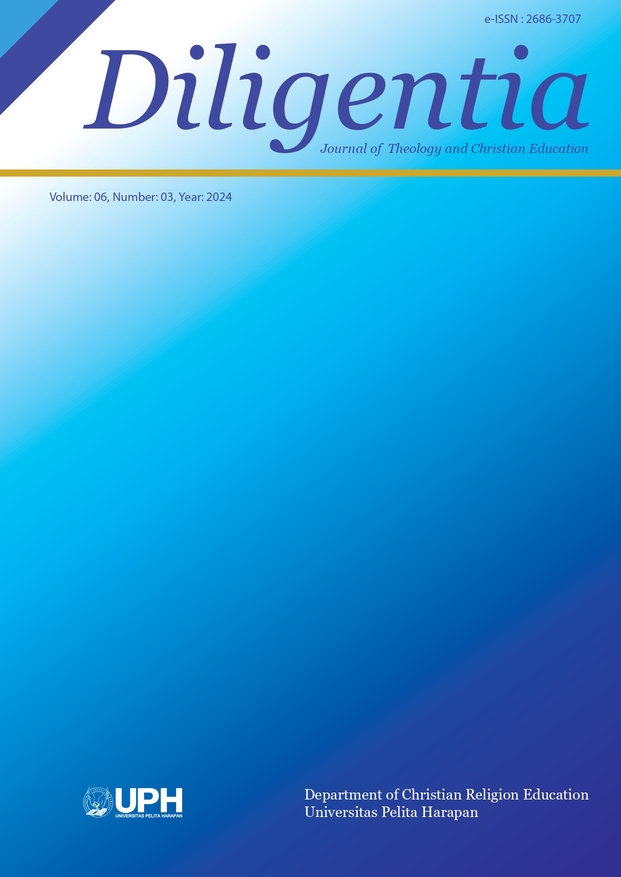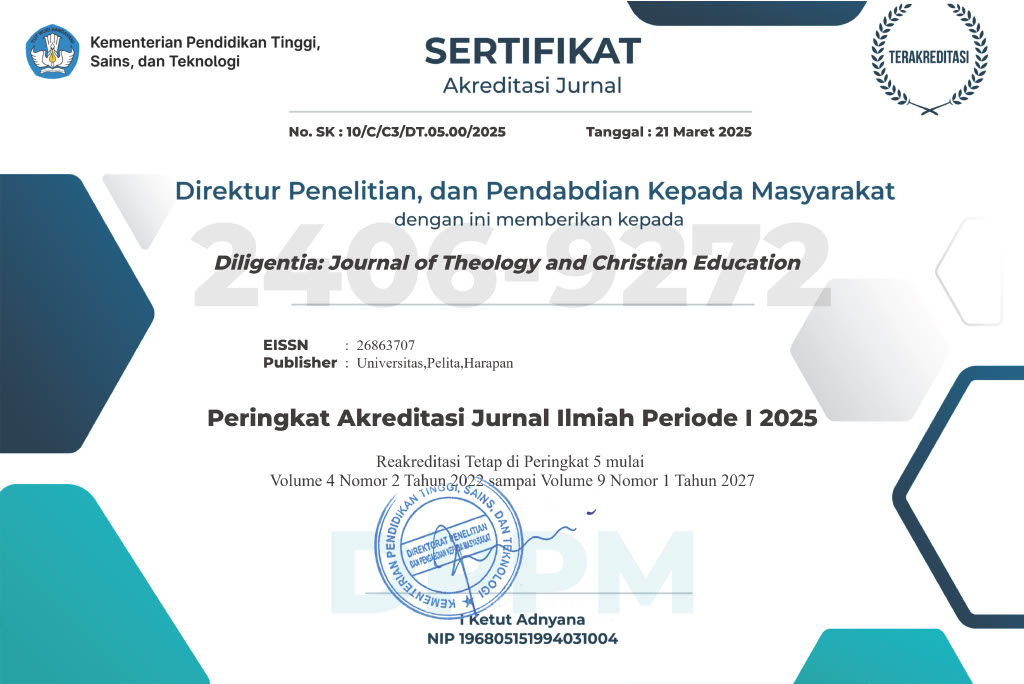Men Shall Be Lovers of Self, Money and Pleasure (II Timothy 3:2, 4): A Contemporary Discourse on the Apostle Paul's Prophecy of the End Times
DOI:
https://doi.org/10.19166/dil.v6i3.8405Trefwoorden:
Perilous times, Lovers of Self, Lovers of Money, Lovers of Pleasure, ProphecySamenvatting
The present time in Nigeria and globally has been more perilous than ever, characterized with bizarre occurrences within the church and the larger society. This study explores the Pauline eschatological prediction of the perilous times when men will become lovers of self, lovers of money, and lovers of pleasure more than God (II Timothy 3:1, 2 & 5). Experiential and theological methodologies were adopted for generating qualitative primary and secondary data. The theological aspect of the research employed the tools of biblical exegesis, textual analysis, and literatures. The experiential aspect involved in-depth interviews (IDIs), observations, social media contents and Focused Group Discussions (FGDs) to access current events and personalized experiences of respondents who were purposively selected from within and outside the church. The results were discussed in the light of Christian theology, social ethics and Pastoral ministry. The Nigerian society is evidently witnessing the perilous times when love of self, money and pleasure will become the untoward defining features of human society and sadly too, of men that profess the faith. Transactional gospel, gimmickry, merchandize of holy things, and self-indulgent love of money are rife in the contemporary church. Ostentatious lifestyles, lack of support for the minister at the local church, and false messages on material blessings are what trap church ministers and laypersons in this end-time evil. The context and practice of ”˜full time’ ministry when the local assembly is not able to support its minister is a challenge that predisposes some to ”˜Simoniacal’ presentations, offering the gifts of God for monetary gain. Sound biblical teachings to protect the people of God and expose the mercenary spirit in sacred function is the local church most potent weaponry.
Referenties
Barnes, Albert. 2 Timothy 3: Barnes' Notes on the Whole Bible. Accessed September 26, 2024. https://biblehub.com/commentaries/barnes/2_timothy/3.htm.
Chironda, Melody. "Nigeria: How Much Did Former Oil Minister ”˜Steal’"? All Africa, September 29, 2017. https://allafrica.com/stories/201709290489.html.
Clarke, Adam. “2 Timothy 3.” Clarke's Commentary. Accessed September 26, 2024. https://www.biblehub.com/commentaries/clarke/2_timothy/3.htm.
D’Souza, Jeevan. “Greed: Crises, Causes, and Solutions.” International Journal of Humanities and Social Science 5, no.7(2015): 1-6.
Guzik, David. “Enduring Word Bible Commentary.” Accessed January 15, 2024. https://enduringword.com/bible-commentary/2- timothy-3/.
Henry, Matthew. “Commentary on 2 Timothy 3:2 ”. Matthew Henry Complete Commentary on the Whole Bible. Accessed September 27, 2024. https: www.blueletterbible.org/Comm/mhc/2Ti/2Ti_003.cfm.
Horrell, David G. Introduction to the Study of Paul. New York: T&T Clark, 2006.
Kets de Vries, Manfred F. R. "The Greed Syndrome.” INSEAD Working Paper No. 2016/26/EFE. SSRN (2016). https://dx.doi.org/10.2139/ssrn.2766233.
Kretzmann, Paul E. “Commentary of the Bible: 2 Timothy 3:2”. Kreztman’s Popular Commentary. Accessed September 27, 2024. https://www.kretzmannproject.org.
“Like a Dog Returning to His Vomit, Benny Hinn Once Again 'Repents' of the Prosperity Gospel.” The Dissenter, May 10, 2024. https://disntr.com/2024/05/10/like-a-dog-returning-to-his-vomit-benny-hinn-once-again-repents-of-the-prosperity-gospel/.
MacArthur, John. “Avoiding the Love of Money.” Grace to You. Accessed 12, 2024. https://www.gty.org/.
Mbewe, Conrad. "A Letter from Kabwata: To Go to Church or Watch Football?" March 12, 2017. Accessed June 2, 2024. http://www.conradmbewe.com/2017/03/to-go-to-church-or-watch-football.html.
Nickelly, Arthur. “The Pathogenesis of Greed: Causes and Consequences.” International Journal of Applied Psychoanalytic Studies 3, no.1 (March 2006): 65-78. https://doi.org/10.1002/aps.50.
Nwezeh, K. and H. Shittu. "Nigeria: U.S.$400 Billion Looted from Treasury-Govt." All Africa. September 13, 2019. https://allafrica.com/stories/201909130041.html.
Olaiya, A. A. “Guide Against Avarice: Examination of Mathew 6:11.” Religion: Journal of The Nigerian Association for the Study of Religions 28, no.2 (July 2018): 101-116
Olarewaju, Isaac. Ethics: Theological and Non-Theological. Ibadan, Nigeria: Harmonious Publications.
Precept, Austin. "Commentary on 2 Timothy 3:1-2." Precept Austin Verse by Verse Commentary by Book. Accessed December 5, 2023. https://www.preceptaustin.org/2_timothy_31-5.
Renner, Rick. "Lovers of Pleasure More Than Lovers of God." Renner Ministries. Accessed June 7, 2024. https://renner.org/article/lovers-of-pleasure-more-than-lovers-of-god/.
Robertson, A. T. "Commentary on 2 Timothy 3:1." Robertson’s Word Pictures of the New Testament. Accessed January 10, 2024. https://www.studylight.org/commentaries/rwp/2-timothy-3.html.
"Thayer’s Greek-English Lexicon." Blue Letter Bible. Accessed February 21, 2024. https://www.blueletterbible.org/resources/lexical/thayers.cfm.
Torrey, Reuben A. “Commentary on 2 Timothy 3: 1,” The Treasury of Scripture Knowledge. Accessed December 22, 2023. https://www.studylight.org/commentaries/eng/tsk/2-timothy-3html.
Vincent Marvin, “2 Timothy 3:2.” Vincent’s Word Studies. https://biblehub.com/commentaries/vws2_timothy/3.htm.
Wesley, John. “Commentary on 2 Timothy 3:2.” John Wesley’s Explanatory Notes on the Whole Bible. Accessed December 13, 2023. https://www.studylight.org/commentaries/wen/2-timothy-3.html.1765.
##submission.downloads##
Gepubliceerd
Citeerhulp
Nummer
Sectie
Licentie
Authors who publish with this journal agree to the following terms:
1) Authors retain copyright and grant the journal right of first publication with the work simultaneously licensed under a Creative Commons Attribution License (CC-BY-SA 4.0) that allows others to share the work with an acknowledgement of the work's authorship and initial publication in this journal.
2) Authors are able to enter into separate, additional contractual arrangements for the non-exclusive distribution of the journal's published version of the work (e.g., post it to an institutional repository or publish it in a book), with an acknowledgement of its initial publication in this journal.
3) Authors are permitted and encouraged to post their work online (e.g., in institutional repositories or on their website). The final published PDF should be used and bibliographic details that credit the publication in this journal should be included














